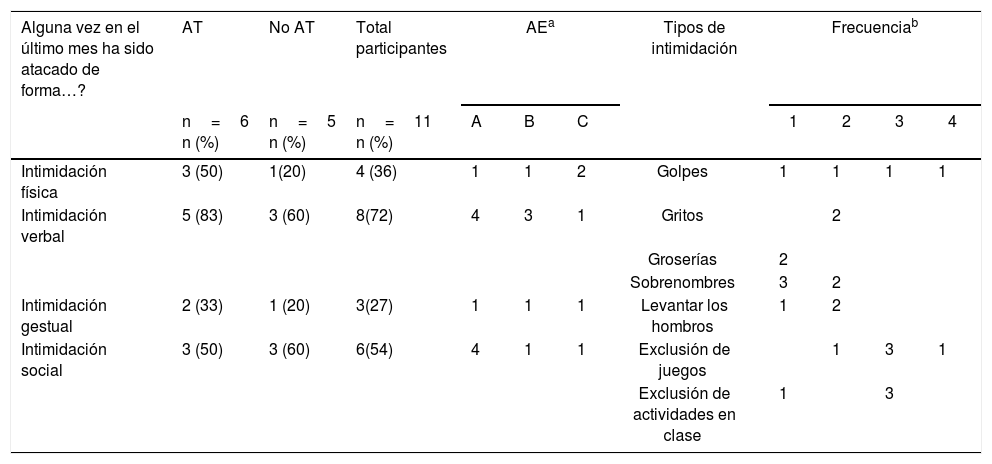Debido al impacto negativo de la condición de salud y las barreras de acceso para participar en la escuela regular en condiciones que no consideran sus necesidades particulares, niños y adolescentes con mielomeningocele tienden a enfrentarse a situaciones de discriminación y exclusión.
ObjetivoEste estudio se centró en niños y adolescentes con discapacidad asociada a mielomeningocele para describir la frecuencia de situaciones de intimidación escolar.
MetodologíaEstudio descriptivo transversal cuya población incluyó pacientes de la consulta de genética médica de una institución de alta complejidad médica. Se incluyó un total de 11 pacientes con diagnósticos de mielomeningocele, con edades entre los 7 y 18 años. Una terapeuta ocupacional realizó entrevistas personales a los pacientes con el fin de completar el instrumento construido para este estudio.
ResultadosSe encontró una relación directa entre tener mielomeningocele y ser víctima de intimidación escolar. Los tipos de intimidación más frecuentes fueron de tipo verbal y social. Dos de los 8 pacientes que reportaron intimidación escolar expresaron haber tenido ideas suicidas en el último mes.
ConclusionesSe insiste en la necesidad de explorar este tipo de situaciones desde la consulta de otras especialidades y a través de un abordaje interdisciplinar para favorecer la atención integral de la población.
Due to the negative impact of their condition and access barriers to regular schools that do not cater to their particular needs, children and adolescents diagnosed with meningomyelocele tend to encounter experiences of discrimination and exclusion.
ObjectiveThis study focused on children and adolescents with disabilities resulting from meningomyelocele and aimed to understand their experiences of bullying at school.
MethodologyThis cross-sectional study recruited participants from a genetic consultation clinic located within a medical institution that works with patients who have highly complex medical needs. The sample included 11 patients between the ages of 7 and 18 diagnosed with meningomyelocele. Interviews were conducted by an occupational therapist using a survey developed specifically for this study.
ResultsThe findings suggest that there is a direct relationship between having meningomyelocele and being bullied at school. The most frequent forms of bullying were verbal and social. Two of the eight participants who reported being bullied at school reported experiencing suicidal ideation in the past month.
ConclusionsThere is a need to explore these types of situations during specialty consultations and a need to collaborate with interdisciplinary teams of health professionals to provide holistic services to patients.
Artículo
Comprando el artículo el PDF del mismo podrá ser descargado
Precio 19,34 €
Comprar ahora









